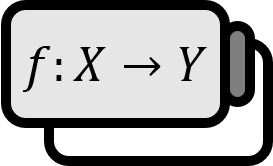Expansion and Contraction of a Function
Definition1
Let’s assume that function $f : X \to Y$ is given. Let’s also assume that $U \subset X \subset V$ holds.
Contraction Mapping
We call $f |_{U}$ a contraction mapping of $f$ if it satisfies the following.
$$ f|_{U} : U \to Y \quad \text{and} \quad f|_{U}(x) = f (x),\quad \forall x \in U $$
Extension
We call $\tilde{f}$ an extension of $f$ if it satisfies the following.
$$ \tilde{f} : V \to Y \quad \text{and} \quad \tilde{f}(x) = f (x),\quad \forall x \in X $$
Explanation
Usually, instead of the translated terms contraction mapping (also known as restriction) and extension, the direct English pronunciations [restriction] and [extension] are used.
Simply put, it’s about narrowing or widening the domain of the function while keeping its shape unchanged.
According to the definition, it’s obvious that $f$ is a restriction of $\tilde{f}$, and an extension of $f|_{U}$.
Erwin Kreyszig, Introductory Functional Analysis with Applications (1989), p99 ↩︎
